May 31, 2025 | 14:47 GMT +7
May 31, 2025 | 14:47 GMT +7
Hotline: 0913.378.918
May 31, 2025 | 14:47 GMT +7
Hotline: 0913.378.918
In the morning, the sun emerges from the sea like a colossal broom, sweeping away steam and clouds. Van Don beach gleamed instantly, pristine and clear as a giant mirror. The myriad islands dotting the Bai Tu Long Bay complex, seen from afar, resembled rows of people clasping hands, forming a formidable barrier on the sea, protecting coves and bays and offering sanctuary from the tumultuous waves and winds.
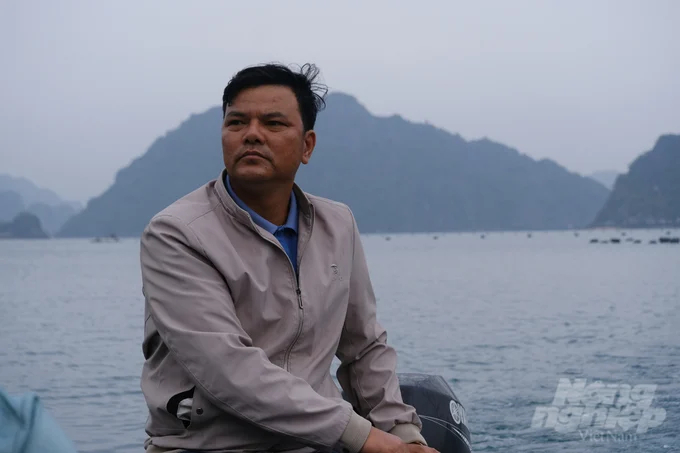
Mr. Ngo Nam Trung, Director of Trung Nam Aquaculture Cooperative, the pioneering entity, allocated sea surface rights in Van Don, Quang Ninh. Photo: Hoang Anh.
Mr. Ngo Nam Trung, the Director of Trung Nam Aquaculture Cooperative, spoke with a voice that seemed to drown out the ocean waves as he arranged to pick us up at Cai Rong port to journey to the oyster farm, a mere 15 minutes away by motorboat from the shore.
Trung Nam is the premier cooperative in Van Don, having finalized project documents and obtained the first water usage license issued by Quang Ninh. This accomplishment lays the foundation for cooperative members to possess a secure and tranquil farming area, serving as a hub for investment in marine farming.
"The name Trung Nam signifies the core marine farming region of Vietnam. It also carries a subtle hint as my name is the inverse of the cooperative's name, Ngo Nam Trung," explained the man with a chiseled countenance.
Trung Nam Cooperative comprises 20 members, all seasoned veterans of marine farming within Van Don for over a decade. Natives of Van Don intimately comprehend the ebb and flow of each tide; in poetic terms, they "listen to the ocean's breath." However, your generation differs from the generations of our forebears.
Previously in Van Don, Trung's ancestors predominantly crafted boats for offshore fishing. Their livelihood relied heavily on nature, with fishing as the primary source of income. However, in your generation, fishing is no longer considered a sustainable profession, as you are increasingly aware of its destructive impact, depriving the sea of the time and opportunity needed for regeneration. "Marine farming" emerges as the primary, long-term sustainable objective.
"The Quang Ninh sea, particularly the Van Don sea, boasts favorable natural conditions, conducive to marine farming, with appropriate depth and salinity for mariculture. A decade ago, marine farming in Van Don primarily focused on cultivating geoducks. The sea stretched so vast that only a handful of farming households could navigate it effortlessly, unlike today," the Director of Trung Nam Cooperative recounted during our journey from the shore to his oyster farm.
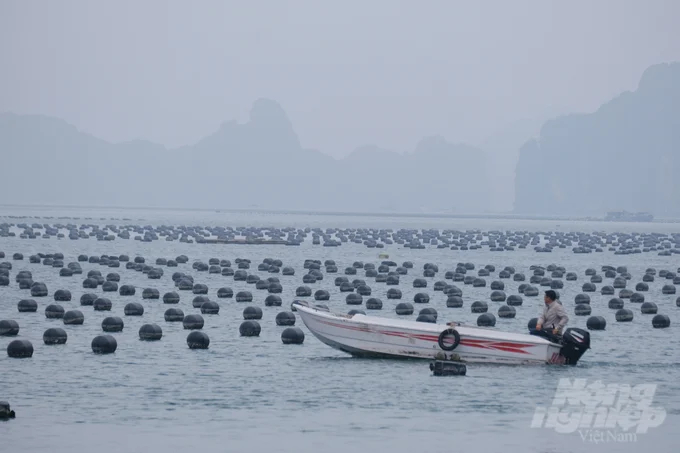
Oyster farming site at sea in Ban Sen island commune (Van Don district) of Trung Nam Cooperative. Photo: Kien Trung.
Amidst the flourishing period of exploiting natural fish stocks, exploitation reached such an extent that there were instances when fishermen returned empty-handed, unable to find any shrimp or fish. Many households were forced to sell their vessels to settle debts, as they lacked the funds for fuel to venture out to sea, eventually abandoning maritime activities. As spontaneous aquaculture gained traction, valuable species were pursued without direction or sustainable planning, resulting in numerous households succumbing to the sea's challenges.
"We began with geoducks, then clams... The initial harvest was consumed, subsequent crops failed, and clams perished en masse with no recourse. However, lacking capital, farmers resorted to mortgaging their land to banks for loans, investing their savings into the sea. Oyster farming followed suit. Initially lucrative, the entire district pivoted to oyster cultivation as it required minimal investment in feed. They simply erected rafts and cultivated them in cages. Yet, when it was time for harvest, oyster prices plummeted to a fraction of their former value during the Covid-19 pandemic, plunging to 2,000 VND/kg, leading to further losses," recounted Mr. Trung.
Mr. Trung's narrative carries a poignant insight that resonates deeply. In the past, sea farmers, fueled by sheer determination, "planted the sea," much like land reclamation efforts, yet faced numerous challenges. Their endeavors, though driven, were often blind, characterized by relentless labor and pursuit of profit without foreseeing the perils of natural disasters or epidemics.
As the motorboat arrived at the oyster farming site, Mr. Trung's story was momentarily interrupted. Spread across over 2 hectares, his net oyster farming area teems with seedlings, nestled within a confined water region in Ban Sen Island commune. One of many rafts dedicated to oyster cultivation, it occupies a 62-hectare expanse of sea recently designated for long-term water surface allocation by Quang Ninh, extending up to 30 years, with the possibility of further extensions up to 50 years.
"Farmers and their means of production are the most enduring assets. We can confidently invest only by securing a stable cultivation area. We cannot afford to falter despite numerous setbacks and exhausting resources along the shore. Our resilience lies in nurturing the sea, comprehending its rhythms," remarked Mr. Trung.
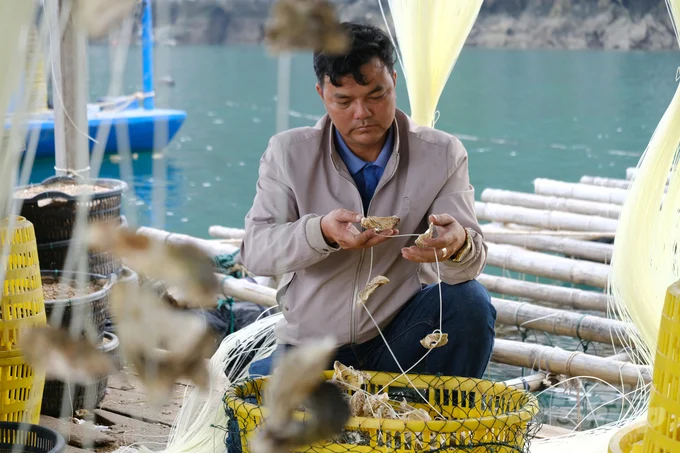
The 51-year-old director of the marine farming cooperative meticulously inspects each oyster seed line before releasing it into the sea. Photo: Hoang Anh.
Gesturing toward a looming peak amidst Bai Tu Long Bay—the site of the oyster farming raft—Mr. Trung remarked, "Recently, I've observed a resurgence of barnacles and green mussels. This resurgence signals the sea's rejuvenation. A few years ago, rampant pollution decimated mussels and barnacles. This underscores the perils of unguided mass sea farming, each individual pursuing their ends, employing materials harmful to the sea, resulting in widespread pollution of the surface water layer.
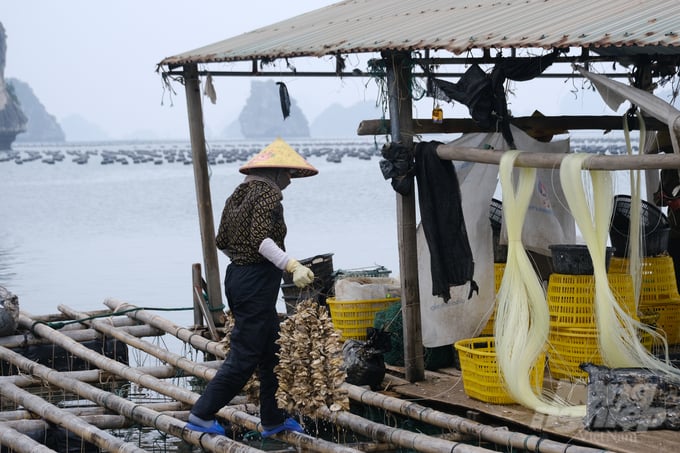
Members of Trung Nam Cooperative inspect newly released oyster seed lines in the sea. Photo: Kien Trung.
"Primarily, the seafarers now possess their 'water sovereignty,' established in a permanent legal document for an initial period of 30 years, extendable for another 20 years. Secondly, holding the 'red card above water' prevents disputes and project overlaps and ensures safety and security at sea. Most significantly, having livestock origins enables the assignment of growing area codes when selling commercial products, thereby integrating into the mariculture cycle chain, significantly elevating the economic value of aquatic species.
Moreover, the mindset and psychology of seafarers experience liberation. They are provided with transparent means of production, supported by legal documentation, which later serves as a 'passport' to verify sea assets for bank loans, facilitating investments in farming. No longer burdened with red covers, their sea-bound assets are 'plugged' into banks akin to real estate red books on the mainland...
"If the policy for allocating agricultural land onshore mirrors that of allocating water surface at sea, it presents a legal avenue that, if implemented methodically and synchronously..., will greatly benefit sea farmers," Mr. Trung expressed.
Mr. Ha Van Ninh, Deputy Head of the Department of Agriculture and Rural Development of Van Don district, disclosed that the total mariculture area in Van Don exceeds 23.8 thousand hectares. This includes areas within 3 nautical miles, encompassing nearly 12.4 thousand hectares, 3 to 6 nautical miles covering 8.3 thousand hectares, and beyond 6 nautical miles, comprising over 3 thousand hectares.
The area designated under the safe and sustainable marine fish farming project exceeds 1,000 hectares (6% of the planned area), while mollusk farming spans 5,773.4 hectares (25%). Van Don boasts 9 communes and towns, all endowed with sea farming potential. Each is meticulously planned and has designated farming areas for administrative units.
Aligned with Quang Ninh province's policy, sustainable mariculture areas are allocated to organizations and individuals, encouraging the assignment of sea territories to legal entities such as businesses and cooperatives. The movement to establish sea farming cooperatives in Van Don is gaining momentum, with every household aspiring to join cooperatives for sustainable, long-term mariculture.
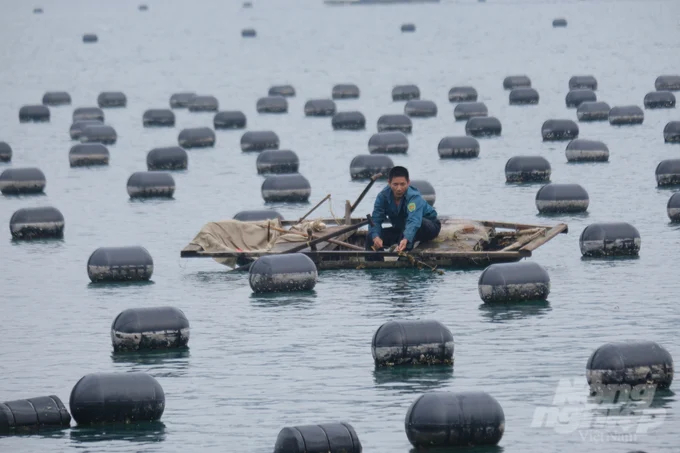
The entire Van Don district comprises 65 cooperatives with 840 members, with 2 businesses actively participating in marine farming. Photo: HA.
Presently, the entire Van Don district comprises 65 cooperatives with 840 members and 2 businesses actively participate in marine farming. Notably, 33 cooperatives and businesses have enlisted consultants to measure and demarcate water surfaces.
Of the cooperatives established thus far (with no data available for measuring or delineating corner closure diagrams), 32 have been formed with 367 members. Among them, 29 have finalized production development projects covering nearly 4,000 hectares while proposing an additional area of 1,823 hectares.
Moreover, numerous other cooperatives are in the final stages of completing projects for submission to the Department of Agriculture and Rural Development. They also urge the Department of Natural Resources and Environment to publish information on the portal for public consultation, facilitating the completion of marine farming dossiers.
Mr. Ninh outlined the plan to finalize the handover of marine areas in Van Don by the first quarter of 2024, instilling confidence in marine farmers for long-term investments.
"Cooperatives are born from farmers, and their boards of directors comprise farmers actively engaged in production and farming. However, their understanding of the process is limited. Securing a cooperative license entails a lengthy process involving advocacy, legal dissemination, and engaging cooperative members. The district has formed working groups and a Zalo group with nearly 100 members to carry out documentation tasks and facilitate declarations. At Trung Nam Cooperative, it took Quang Ninh authorities 5 months to complete procedures for the province to issue a water surface transfer license. Additionally, 12 other cooperatives are finalizing environmental impact assessment reports to complete procedures prior to water surface handover," Mr. Ninh elucidated.
In Van Don Island district, the fervor for establishing cooperatives is palpable. They await the implementation of Quang Ninh's pioneering mechanisms and policies for sea farming and water surface allocation nationwide, executed methodically, synchronously, and for the long term!
Translated by Quynh Chi
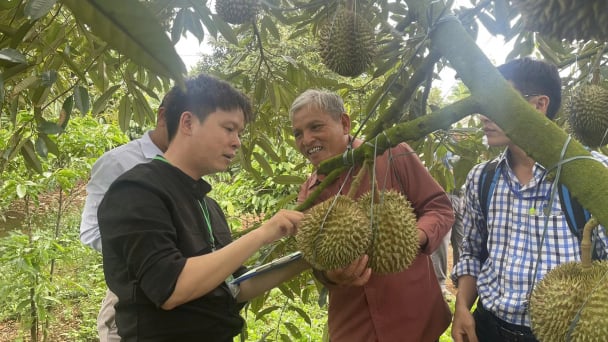
(VAN) For the durian industry to succeed, the value chain must fulfill its commitments to the government, the community, and international partners.

(VAN) Vaccinating juvenile pangasius helps reduce disease, antibiotic use, and farming costs, increasing profits for export-oriented farmers in An Giang.

(VAN) Due to a limited supply of workforce and competitive recruitment requirements, businesses struggle to retain talented veterinary human resources.

(VAN) WOAH’s guidance aims to mitigate disease risks through a One Health approach that balances economic, conservation, and public health interests.

(VAN) Ms. Nguyen Thi Dung, Deputy Director of Ngoc Hoang Cooperative, shared about the journey of bringing dragon fruit to Europe, achieving annual revenues in the billions of VND.

(VAN) Bamboo products from Thang Tho Bamboo Cooperative have reached many countries around the world, while also creating jobs for local workers.

(VAN) The Management Board of Con Dao National Park reported that a green sea turtle, tagged in the Philippines, has traveled thousands of kilometers to lay 84 eggs on Bay Canh Islet.